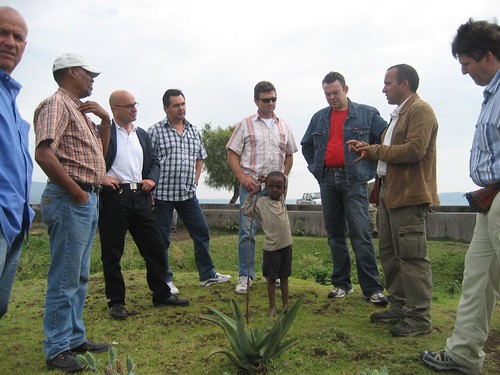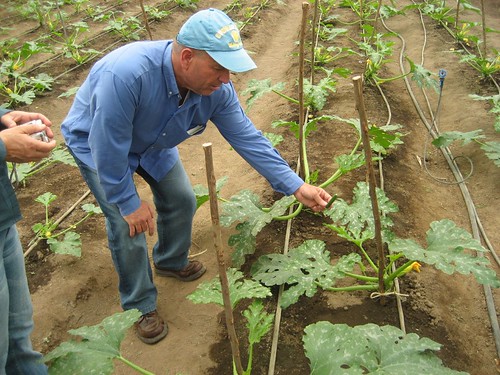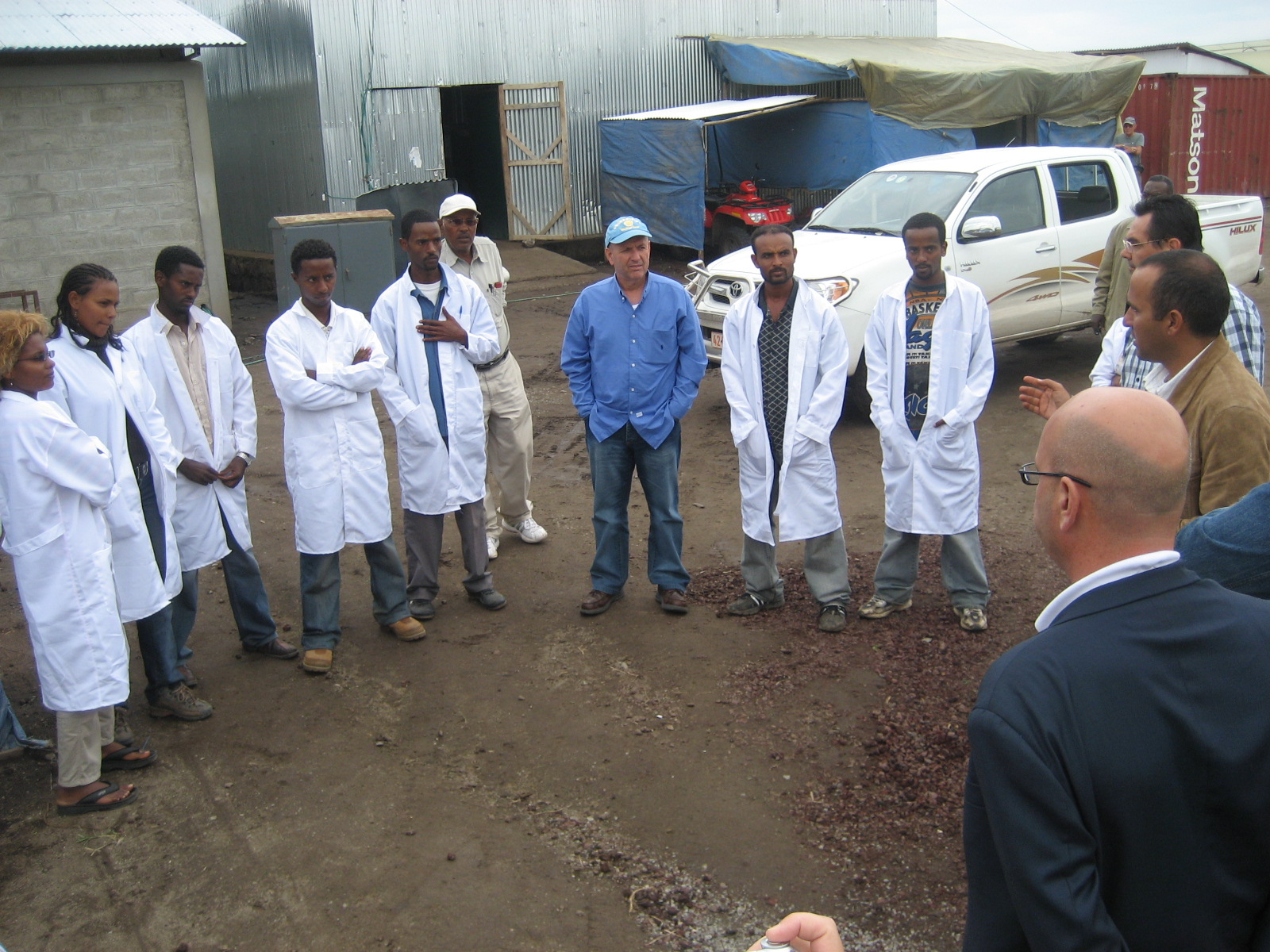Few days ago I came across Matt Simpson's story on "The manager who thought he could create a community". It is a kind of stories that you often face during work with organizations and executives. A story which combines Executives, Knowledge and Technology, and misunderstanding of the nature of knowledge in organizations.

- Awassa, Ethiopia
Now let's have a look on the photo above. What you see here is a group of people talking. You can see that these people are from different origins, only by look at them, right? Now, let me add few more details: they were gathered together in a specific location, in that case, a herb farm in Awassa, Ethiopia. Here is some more: they were talking here on a specific issue which they all have some interest – dealing with insects that damage the herb crops. Now, what the photo does not explain is that these people have specific agenda and interests, yet in the sense of elimination of insects in that farm they all share a common interest: to overcome this problematic issue successfully.
So, what is the story…? Well, the people in that photo that came to Ethiopia few years ago were buyers of herb products from Europe; Italian, Germans, British and French. The Owners of the farm were an Ethiopian businessman and an Israeli who runs the farm. The marketing and sales manager was also an Israeli. This group of people have a priceless wealth of knowledge on herbs, based on dozen of years of experience on all angles of herbs life-cycle.
The essence of this story reflects the core of the "Knowledge" issue – or let me be more specific – the "Knowledge management" issue.
And why is that? Because, knowledge is for action, not for "warehousing". These buyers were invited to Ethiopia in order to show them all the process of growing the herbs, sending them to Europe, so the will be assure in person and develop trust relations with the new growers.
No one planned in advanced that the issue of insects will be raised during the visit. Nor, they were asked to come to the visit as formal advisers or experts in the field. However, when they were following the growing process in one of the hothouses in this huge farm, a question in regard, was raised.

- Awassa, Ethiopia
Even though I work with executives and organization on Learning and Knowledge processes, at this visit to Ethiopia, I was only a company to a friend, so I took this non-official presence and opportunity to "Shadow" the event, observing it and reflect on what I saw through a prism of Knowledge and Management.
And indeed what happened was precisely adequate to what is called "Knowledge to action"; all people who were presented started a professional knowledgeable dialog between experts. No one was forced to, or lead to, or guided to open a formal session. It was ignited naturally, was held with openness, honoring each opinion and cherish experience, benefit from it. When I observed that I knew I am facing a community of practice.
This "COP" was 'built' from people who have relevant knowledge, which they were sharing disregard the fact that they may represent or have opposite interests, the manner of the dialog was professional, focused, open and the most important: I saw how they were all pleased when the agreed together on a mode of operation which was new knowledge that they created together.
And one more thing: they ere telling stories. I mean, when you hear what they say – you realize that they communicate their message, experience, suggestions, solutions, market details, agriculture methods, past experience, research processes – in a form of stories. These stories were their personal stories, told by them directly, and they were told in a humble manner – not to emphasize how much they know, but the contrary: how much more they have to learn, and would other people present will kindly share their experience, too. It left nothing but a deep positive impression that the main interest is to find a solution and to prominent one of others.
No technology was used in this case; or shall I say that the most ancient technology took part dominantly – people gathered and talked on an issue they find relevant and interests – in this event: how to overcome the damage from insects.
The same event duplicate itself when we got back to the farm headquarters and with the group of agronomists, working at the farm.

- Tabor Herbs farm, Awassa, Ethiopia
Here again was a get-acquaintance meeting which smoothly and naturally flowed into a multi-dialog between experts on several issues which keep agronomists as well as growers busy in finding solutions.
I can only imagine trying to "pump" this new contextual knowledge and "warehouse" it in a form stored in a database.
Dave Snowden in his "Rendering knowledge" called that (2nd point): "we only know what we know when we need to know it". Larry Prusak once said "Knowledge is profoundly social…it happens only in social interactions…". (Hebrew!).
I believe that initiating and establishing a successful community of practice can be a combination of these two insights, and frankly, do not need "Management". As we already know, in if not we can read Jones & Goffee research on it, titled "Leading Clever People" and raise that is the main challenge for executives today, for what this researchers ask: "How do you manage people who don't want to be led and may be smarter then you…"
What's your story?

Nice story. Thanks. I think that the missing 'management' element was simply this: an environment was created in which knowledge could be shared and enhanced. Someone had to organise the event and bring the people together. And I bet those people had never heard of 'knowledge management', but that's what they were doing.
No doubt the outcomes could be captured and archived as useful information, especially if it were tagged adequately and made easy to find. But this is more content, or information, management, not KM.
Were the people (in the interests of cutting travel, CO2 emissions, whatever) able to cooperate through social tools, telepresence, or whatever, this too would be part of the 'management' role – that of creating the right environment for knowledge sharing to flourish.
This story is about farmers who share knowledge about farming. These people are participating in a process of sharing and generating knowledge without an explicit management process. The organisers of this meeting did not plan for this kind of knowledge sharing, it just happened because people with the right kind of knowledge and experience found themselves more or less accidentally focused on a subject that had their interest. This happened in a context that facilitated open exchange of this knowledge.
It appears to me that the 'management role' you refer to has a lot in common with the subject these people are discussing: farming. It has more to do with facilitating than with the traditional 'control' style of management. Knowledge management seen in this way is more like 'farming' knowledge. It is all about creating the right circumstances: fertilizing and irrigating the soil. Of course there is a 'control' aspect in seeding crop, weeding weeds,and trimming. And a good farmer knows a lot of planning: when to seed what and on what kind of land. But once the decisions have been made and the seeding is done, the focus is on creating and maintaining optimal conditions for the plants of knowledge to grow and flourish. The growth of these plants of knowledge can not be forced, cannot be 'controlled'. It's an organic process that can only be facilitated. Some knowledge is like fast-growing crop, once seeded the plants grow fast like weeds. Other knowledge is more like the trees in old fruit gardens. They take long to grow and need a lot of care as saplings, but grow strong and bear fruit for many years.
I agree with you that managing the outcome of 'knowledge management' is primarily the scope of information or even content management. Storing grain in a warehouse has little to do with growing it, it's what happens after harvesting it. And stored grain is of little use for a baker; it has to be processed further, it has to 'flow'.
Maybe we should talk less about 'knowledge management' and more about 'knowledge gardening'? That sounds even friendlier than 'knowledge farming' and has a sense of beauty in it.
פינגבאק: Library clips :: Real KM : It’s about the match play, not the scoreboard :: July :: 2010
כמו שאמרנו, לא צריך הרבה. צריך משהו שיקח את היוזמה, חבורה שתלך איתו ויעד משותף להשגה.
אה וחשוב מאוד, אנשים בעלי ידע שחושבים פתוח ומבינים שהם לא יודעים הכול. עוצמת המומחים אם תרצה.
מעניין, מאוד מעניין.
אתה מפשט בשבילי בדיאלוג ובדוגמאות שאתה מביא את יכולת הובלת ניהול הידע בפסג"ה. תודה
מה שהיה במקרה הזה זה צורך ארגוני אמיתי שהתברר לפתע בשטח.
חג שמח